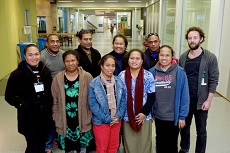Victoria University hosts inaugural combined BioLive/ChemEd Conference
The conference, previously run seperately, attracted nearly 300 Chemistry and Biology teachers from around the world to Wellington.

Nearly 300 Chemistry and Biology teachers from around New Zealand, and as far afield as Turkey, Japan, and Singapore have been hosted at Victoria University of Wellington for the first BioLive/ChemEd Conference.
The three-day conference was geared towards exploring the connections between biological and chemical sciences, and how these disciplines are taught at high school.
“Previously the BioLive and ChemEd conferences were run separately. Bringing them together has been a great way to start conversations about the similarities between the areas, and promote thinking in new ways to enhance teaching and learning in these subjects,” says Victoria University teaching fellow and conference organiser, Suzanne Boniface.
“Some of the discussions we’ve had have been about shifting the language from how we teach, to how students learn. It’s an important change, because, while to some extent it’s still a ‘one-size-fits-all’ solution, there are more opportunities for different ways of learning.”
This year the cohort includes 10 teachers from the Pacific Islands (right) who have been able to attend because of the generous support of IUPAC (International Union of Pure and Applied Chemistry), UNESCO and NZAid.
“It’s been really special to have these teachers here, and for them to have the opportunity to network with other teachers, access new resources and learn about different ways of engaging their students. We’re really grateful to IUPAC, NZAid and UNESCO who have provided the funding for them to be here,” says Suzanne Boniface.
The teachers have described the conference positively.
“We’ve learnt so much about different teaching strategies, which we can take home and share with colleagues as well. We feel so blessed to be here,” said one participant.
Over the three days the teachers heard from keynote speakers, engaged in workshops, and toured prominent science research centres, including GNS, Callaghan Innovation, NIWA, Victoria University labs, and the Victoria University Coastal Ecology Lab in Island Bay.
The BioLive/ChemEd 2015 Conference was supported by Victoria University of Wellington, IUPAC, Allan Wilson Centre, Silverback Academic Media, The MacDiarmid Institute for Advanced Materials and Nanotechnology, Biology Educators’ Association of New Zealand, NZIC, New Zealand Association of Science Educators, Capital City Science Educators, and the Maurice Wilkins Centre for Molecular Biodiscovery.
